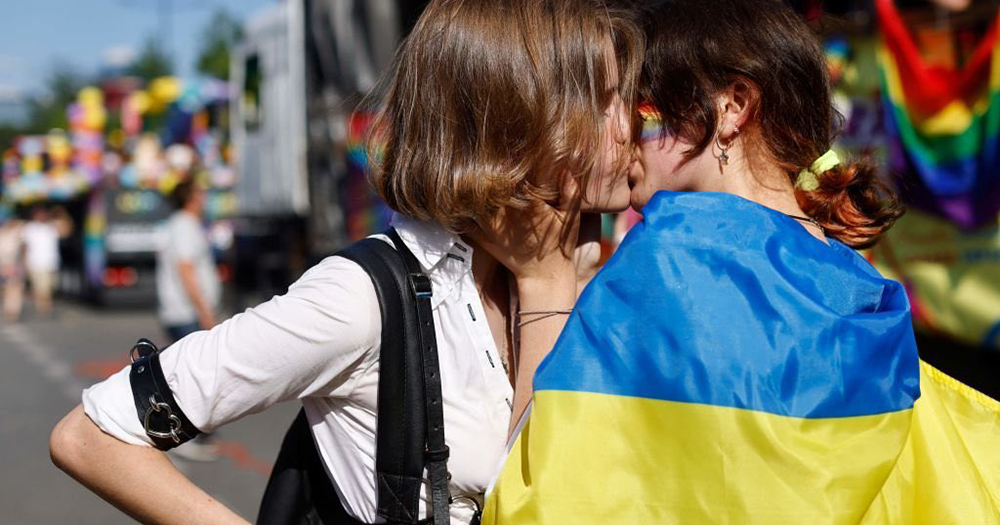Content Warning: Mention of sexual violence and suicide.
On February 24, 2022, under Vladimir Putin’s leadership, Russia officially launched a large-scale invasion of Ukraine. One year on, the war persists, with tens of thousands of casualties recorded to date and LGBTQ+ Ukrainians more vulnerable than ever.
Speaking to PinkNews, Kyiv Pride’s Edward Reese described feeling “angry and tired” in relation to the conflict.
“We really want Russia to get out of our country as soon as possible. We want victory,” he said.
“We know we will win this war, that we will have our victory, but it’s definitely very hard to go through all of the things that we go through – from the death of our close ones to bombings.
“But we are not scared. We are tired, angry and active.”
Edward was one of many to emigrate from Ukraine when the war began. However, he has since returned home and resumed working on the ground with Kyiv Pride.
Before the Russian invasion, the organisation’s main focus was to organise the capital city’s annual Pride march. Today, it operates a shelter for LGBTQ+ Ukrainians and their families, provides mental health support for those in need and teaches people new skills to help them earn a living.
Everyone in Ukraine is now doing their part to win. Someone is at the front, someone is volunteering, someone is donating or communicating with Western partners, demanding more weapons. In 2022, all Pride marches in the world marched for Ukraine – and it was because of us all. ⬇️
— KyivPride (@KyivPride) February 24, 2023
The queer community is reported to be particularly at risk in occupied areas, with Russian soldiers allegedly hunting for and abusing victims. LGBT Human Rights Nash Svit Centre, a Ukrainian NGO, says it has documented 105 alleged cases of human rights violations at the hands of Russian authorities and 50 calls to its hotline making similar claims.
According to the organisation, one lesbian couple was targetted by three armed soldiers who barged into the small abandoned house in which the pair were living.
“One of the soldiers asked us, ‘What are you, those ‘pinks’?’” a victim recalled, also revealing the sexual abuse that both women suffered.
“We were r*ped, me and my girlfriend, using physical force,” she said. “After the violence, the attackers turned over everything looking for money and jewellery. We had nothing and they left.”
For twelve months, @KharkivPride and @KyivPride have worked tirelessly to provide humanitarian support to LGBTI+ people in Ukraine. Donate to support their work: 100% goes directly to them. #StandWithUkraine https://t.co/Kipe6zF2BR
— EPOA • EuroPride (@EuroPride) February 24, 2023
In a separate instance, a group of young men accused of being gay were allegedly taken hostage by Russian soldiers.
“They held them in a house and humiliated them, r*ped them,” Vitalli Tsariuk, a hate crime monitor for the Nash Svit Centre, told SBS News.
“It was group r*pe and they pissed on them. In the morning they threw them outside. These young men were aged between 19 and 21. One of them later took his own life,” Tsariuk said.
“[Russian soldiers] have lists of LGBTQ activists who appear on television and participate. I know about those lists and I thought I would be on there also,” he added.
Marianna Polevikova, Managing Director of LGBTQ+ organisation For Equal Rights, fled the country the day that Russian tanks came into Ukraine. She has since been helping to evacuate other LGBTQ+ Ukrainians and says that in Kherson, a city that was occupied, enemy soldiers “have hunted and abused” queer people.
“They would set up fake dates through a dating site. Many LGBTIQ+ people were taken hostage,” she said.
“We know of some taken into torture rooms, lesbians that were unfortunately r*ped, some people were shot in the legs, some people went missing and still have not been found.”
Polevikova continued, saying “Transgender people were afraid to go out because the Russian soldiers would randomly stop them. People who had tattoos with Ukrainian and LGBTIQ+ symbols were in danger.”
366 days after the launch of the invasion, the fate of Ukraine and its population, including the local LGBTQ+ community, remains uncertain. However, one thing is evident – whether staying in the country, evacuating, or returning home after time away, under Putin’s homophobic and transphobic regime, the threat of persecution and violence persists.
© 2023 GCN (Gay Community News). All rights reserved.
Support GCN
GCN is a free, vital resource for Ireland’s LGBTQ+ community since 1988.
GCN is a trading name of National LGBT Federation CLG, a registered charity - Charity Number: 20034580.
GCN relies on the generous support of the community and allies to sustain the crucial work that we do. Producing GCN is costly, and, in an industry which has been hugely impacted by rising costs, we need your support to help sustain and grow this vital resource.
Supporting GCN for as little as €1.99 per month will help us continue our work as Ireland’s free, independent LGBTQ+ media.
